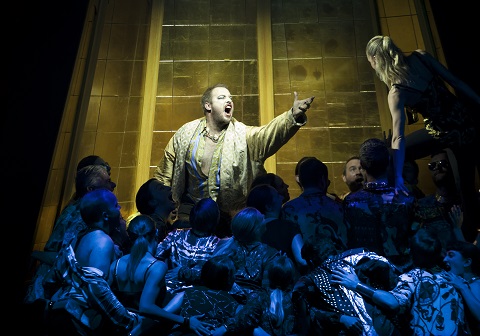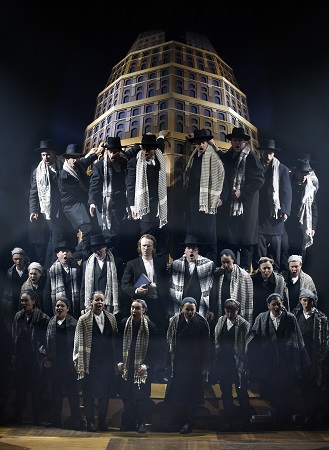Recently in Reviews
English Touring Opera are delighted to announce a season of lyric monodramas to tour nationally from October to December. The season features music for solo singer and piano by Argento, Britten, Tippett and Shostakovich with a bold and inventive approach to making opera during social distancing.
This tenth of ten Live from London concerts was in fact a recorded live performance from California. It was no less enjoyable for that, and it was also uplifting to learn that this wasn’t in fact the ‘last’ LfL event that we will be able to enjoy, courtesy of VOCES8 and their fellow vocal ensembles (more below …).
Ever since Wigmore Hall announced their superb series of autumn concerts, all streamed live and available free of charge, I’d been looking forward to this song recital by Ian Bostridge and Imogen Cooper.
The Sixteen continues its exploration of Henry Purcell’s Welcome Songs for Charles II. As with Robert King’s pioneering Purcell series begun over thirty years ago for Hyperion, Harry Christophers is recording two Welcome Songs per disc.
Although Stile Antico’s programme article for their Live from London recital introduced their selection from the many treasures of the English Renaissance in the context of the theological debates and upheavals of the Tudor and Elizabethan years, their performance was more evocative of private chamber music than of public liturgy.
In February this year, Albanian soprano Ermonela Jaho made a highly lauded debut recital at Wigmore Hall - a concert which both celebrated Opera Rara’s 50th anniversary and honoured the career of the Italian soprano Rosina Storchio (1872-1945), the star of verismo who created the title roles in Leoncavallo’s La bohème and Zazà, Mascagni’s Lodoletta and Puccini’s Madama Butterfly.
Evidently, face masks don’t stifle appreciative “Bravo!”s. And, reducing audience numbers doesn’t lower the volume of such acclamations. For, the audience at Wigmore Hall gave soprano Elizabeth Llewellyn and pianist Simon Lepper a greatly deserved warm reception and hearty response following this lunchtime recital of late-Romantic song.
Collapsology. Or, perhaps we should use the French word ‘Collapsologie’ because this is a transdisciplinary idea pretty much advocated by a series of French theorists - and apparently, mostly French theorists. It in essence focuses on the imminent collapse of modern society and all its layers - a series of escalating crises on a global scale: environmental, economic, geopolitical, governmental; the list is extensive.
For this week’s Live from London vocal recital we moved from the home of VOCES8, St Anne and St Agnes in the City of London, to Kings Place, where The Sixteen - who have been associate artists at the venue for some time - presented a programme of music and words bound together by the theme of ‘reflection’.
'Such is your divine Disposation that both you excellently understand, and royally entertaine the Exercise of Musicke.’
Amongst an avalanche of new Mahler recordings appearing at the moment (Das Lied von der Erde seems to be the most favoured, with three) this 1991 Mahler Second from the 2nd Kassel MahlerFest is one of the more interesting releases.
‘And there was war in heaven: Michael and his angels fought against the dragon; and the dragon fought and his angels, And prevailed not; neither was their place found any more in heaven … that old serpent … Satan, which deceiveth the whole world: he was cast out into the earth, and his angels were cast out with him.’
If there is one myth, it seems believed by some people today, that probably needs shattering it is that post-war recordings or performances of Wagner operas were always of exceptional quality. This 1949 Hamburg Tristan und Isolde is one of those recordings - though quite who is to blame for its many problems takes quite some unearthing.
There was never any doubt that the fifth of the twelve Met Stars Live in Concert broadcasts was going to be a palpably intense and vivid event, as well as a musically stunning and theatrically enervating experience.
‘Love’ was the theme for this Live from London performance by Apollo5. Given the complexity and diversity of that human emotion, and Apollo5’s reputation for versatility and diverse repertoire, ranging from Renaissance choral music to jazz, from contemporary classical works to popular song, it was no surprise that their programme spanned 500 years and several musical styles.
The Academy of St Martin in the Fields have titled their autumn series of eight concerts - which are taking place at 5pm and 7.30pm on two Saturdays each month at their home venue in Trafalgar Square, and being filmed for streaming the following Thursday - ‘re:connect’.
The London Symphony Orchestra opened their Autumn 2020 season with a homage to Oliver Knussen, who died at the age of 66 in July 2018. The programme traced a national musical lineage through the twentieth century, from Britten to Knussen, on to Mark-Anthony Turnage, and entwining the LSO and Rattle too.
With the Live from London digital vocal festival entering the second half of the series, the festival’s host, VOCES8, returned to their home at St Annes and St Agnes in the City of London to present a sequence of ‘Choral Dances’ - vocal music inspired by dance, embracing diverse genres from the Renaissance madrigal to swing jazz.
Just a few unison string wriggles from the opening of Mozart’s overture to Le nozze di Figaro are enough to make any opera-lover perch on the edge of their seat, in excited anticipation of the drama in music to come, so there could be no other curtain-raiser for this Gala Concert at the Royal Opera House, the latest instalment from ‘their House’ to ‘our houses’.
"Before the ending of the day, creator of all things, we pray that, with your accustomed mercy, you may watch over us."
Reviews

28 Jun 2019
Handel’s Belshazzar at The Grange Festival
What a treat to see members of The Sixteen letting their hair down. This was no strait-laced post-concert knees-up, but a full on, drunken orgy at the court of the most hedonistic ruler in the Old Testament.
This is, of course, The Grange Festival’s production of Handel’s rarely
staged oratorio Belshazzar. Kitted out variously in the guise of
Babylonians, Jews and Persians and enhanced by The Grange Festival Chorus,
The Sixteen along with their director Harry Christophers have been
celebrating their 40th anniversary.
At a time of political uncertainty in Britain (alongside claims of
anti-Semitism) and continuing unrest in the Middle East this production
could not be more timely. The work’s opening soliloquy makes clear the
transient nature of empire, comparing its deadly power to a monster that
“robs, ravages and wastes the frighted world”. Sounds familiar? Oblique
references to the current political climate this may be, but Handel’s
dramatic oratorio may also have had striking contemporary resonances for
the British people serving under a German monarch, George II, when it was
first performed at the King’s Theatre, Haymarket, London in 1745.
In this performance in leafy Hampshire, a revolving model Tower of Babel
and an intimidating defensive wall around the Babylonian city (just two of
designer Robert Innes Hopkins’s imaginative creations) invoked notions of
Trump Tower and controversial US border issues, yet these were more oblique
references than heavy handed finger wagging. Handel’s setting of Charles
Jennens’s libretto (he of Saul and Messiah) recounts the
fall of Babylon and the liberation of the Jews by the conquering Persians
whose diversion of the Euphrates (seen by Cyrus in a dream) allows them to
access the city on a night of sacrilegious revelry. Pleas for Belshazzar
not to violate the Israelite’s God go unheeded and a ghostly text predicts
his downfall. Thanks to The Grange Festival’s artistic director Michael
Chance this performance (not originally conceived for the stage) enabled an
excellent team of soloists, the chorus and orchestra of the Sixteen to
remind us of Handel’s wealth of theatrical instincts.
 James Laing (Daniel) with the Sixteen and the Grange Festival Choruses. Photo credit: Simon Annand.
James Laing (Daniel) with the Sixteen and the Grange Festival Choruses. Photo credit: Simon Annand.
Under Daniel Slater’s imaginative direction this fully-fledged operatic
conception included, in addition to the Brueghel-inspired Tower, three
eye-popping acrobats whose perilous movements brought visual spectacle to
Belshazzar’s lavish quarters and suggested that they, like the king and his
sybaritic entourage, might be on the brink of disaster. Sharply delineated
costumes neatly outlined national identities; brightly garbed party-set
Babylonians, darkly clad Jews with traditional prayer shawls and, for the
Persian army, military tunics straight out of Star Wars. Getting
in and out of this attire was something of an achievement during one chorus
where, in just a few bars, the marauding Persians morph into body-writhing
Babylonians. That said, the Sixteen readily embrace these roles, entering
into the spirit with undisguised relish and acting their parts as if born
to them.
No less involved is Robert Murray’s impressively sung Belshazzar whose
gilt-edged tenor dispatches demanding arias with ease and portrays a
character whose excesses alarm and revolt. Clearly beyond the control of
his long-suffering Nitocris, he is unrepentant after the Jewish prophet
Daniel interprets the writing on the wall - a captivating scene bringing
emotional trauma to both. Claire Booth is a richly characterised Nitocris,
who brings clear cut credulity to a grieving and finally humiliated mother,
her compassion and anxieties for her son movingly expressed in ‘Alternate
hopes and fears distract my mind’. Only her romantic attachment to Daniel
seems to a strike false note - one that reduces the honour of both parties
and unnecessarily creates a degree of exaggerated melodrama. James Laing
fashions a scholarly-looking Daniel and sings with reassuring eloquence,
while Christopher Ainslie as a benevolent Cyrus dazzles more for his
bravura rendition of ‘Destructive war, thy limits know’ while clinging onto
the side of the ziggurat than his valour as a heroic champion of the
Persians. By contrast, Henry Waddington’s son fixated Gobrias was sung with
spirited vengeance.
What consistently claims attention is the discipline and vigour of the
augmented chorus. The Sixteen bring emotional substance to their distinct
roles (whether mocking, imploring or warmongering) and textural clarity to
their contrapuntal lines. The score is driven along with a sureness of
touch from the podium - Christophers drawing incisive, well-balanced
orchestral playing, completely at home in this gem-filled score.
David Truslove
Belshazzar - Robert Murray, Nitocris - Claire Booth, Cyrus - Christopher
Ainslie, Daniel -James Laing, Gobrias - Henry Waddington, Acrobats (Haylee
Ann, Craig Dagostino and Felipe Reyes); Director - Daniel Slater, Conductor
- Harry Christophers, Designer - Robert Innes Hopkins, Movement Director -
Tim Claydon, Lighting Designer - Peter Mumford, The Grange Festival Chorus
& The Sixteen.
The Grange Festival, Hampshire; Saturday 22nd June 2019.

